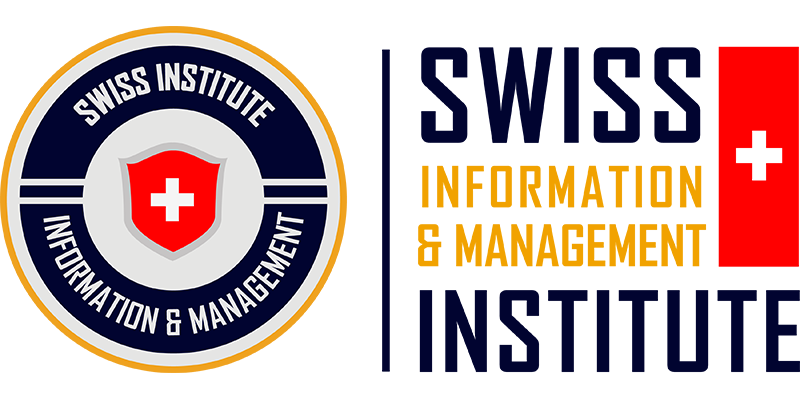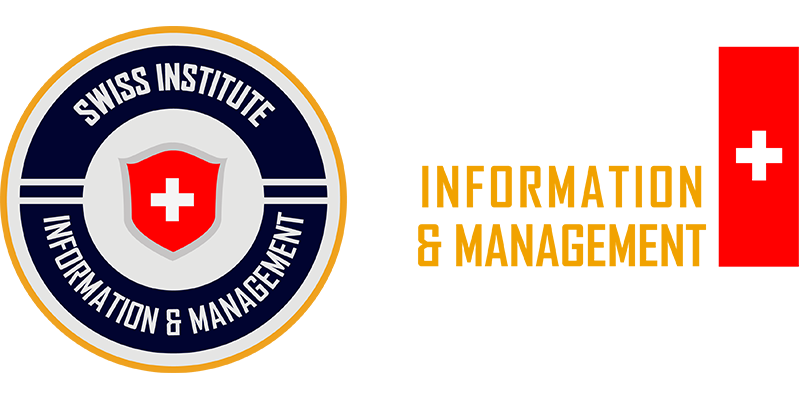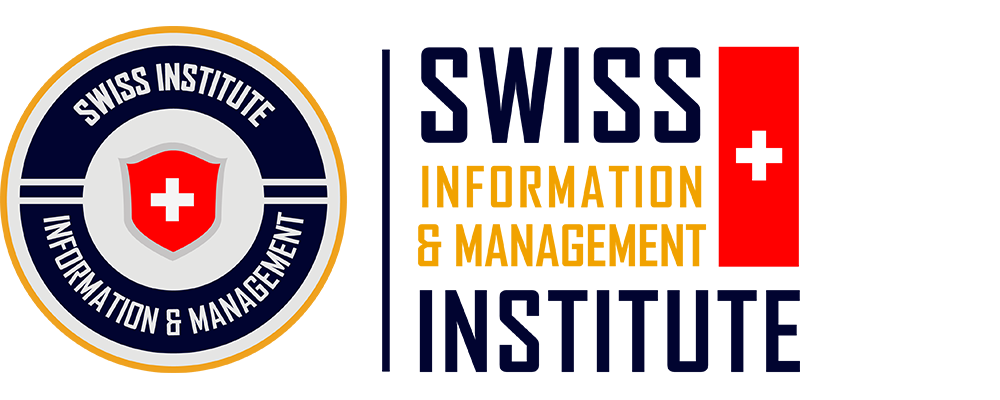The only Swiss Bachelor of Entrepreneurship and Management with fully recognized qualifications for each year
The Swiss Bachelor of Entrepreneurship and Management program stands out as a distinctive pathway to success in the field of business. This program offers a unique structure where students earn fully recognized qualifications for each academic year, making it the only program in Switzerland to provide such an opportunity. With this approach, students can accumulate globally recognized credentials at the end of every year, enabling them to enhance their careers while continuing their studies. The program is meticulously designed to equip students with a comprehensive education in entrepreneurship and management, giving them a competitive edge in the job market right from the start.
Key Benefits of Fully Recognized Yearly Qualifications:
- Early Career Entry
- Financial Flexibility
- Increased Employability
- Career Security
- Global Recognition
- Academic and Professional Balance
- Flexibility in Progression
Along with globally recognized yearly qualifications, the SIMI Swiss program understands what bachelor’s students need:
- Fully Accredited & Recognized
- The Swiss Student Card confirms official Swiss student status and eligibility with SIMI Swiss
- Certified & Micro-Credentials Included
- Multiple Qualifications from SIMI & Prestigious Universities
- Stay updated with the latest trends
- Flexible Learning Model
- Expand your business network
- Academic Support While Studying
- Tuition fee support provided by Swiss EduFund
Qualifications & Professional Recognition within a Bachelor of Entrepreneurship and Management Program:
- Year 1: Qualifi Level 4 Diploma in Entrepreneurship (Gov Recognition No. 603/4238/9)
- Year 2: Qualifi Level 5 Diploma in Business Management (Gov Recognition No. 601/6049/4)
- Year 3: OTHM Level 6 Diploma in Business Management (Gov Recognition No. 603/2179/9)
- Final Stage: SIMI Swiss Bachelor of Business Administration (with Hons) in Entrepreneurship and Management (Full Accreditation & Recognition HERE)
International Accreditation
SIMI is accredited at both the institutional and programmatic levels by ASIC, HEAD, ISO 21001:2018, OTHM, and Qualifi, which is recognized by Ofqual.
Multi Qualifications
The program is widely recognized by the business community and partners, helping to optimize the use of the diploma after graduation.
30 Pro Recognize credentials
Learners earn 30 professional recognized certifications aligned with the European occupational framework, optimizing their skills upon graduation.
Academic & Research Support
The academic, research and language support system helps students overcome challenges so they can focus solely on excelling in their studies.
Learn and Earn
Year 1 Learn
1. Managing Business Operations (ENT1.1)
Overview
- Explore key aspects of business operations and their role in organizational success.
- Focus on internal processes and their contributions to business outcomes.
Unit Aims
- Understand how business operations impact organizational efficiency.
- Develop skills to analyze and improve business processes.
Course Details
This course is accredited and mapped to National Occupational Standards. It can also be accumulated towards earning an Undergraduate Award from SIMI Swiss if taken independently.
- View details on Learning Outcomes, Topics, and Suggested Readings HERE.
2. Business Environment (ENT1.2)
Overview
- Analyze the external factors influencing business operations and strategy.
- Assess the interplay between global and local business environments.
Unit Aims
- Identify key environmental factors affecting business decisions.
- Apply analytical tools to evaluate business environment impacts.
Course Details
This course is accredited and mapped to National Occupational Standards. It can also be accumulated towards earning an Undergraduate Award from SIMI Swiss if taken independently.
- View details on Learning Outcomes, Topics, and Suggested Readings HERE.
3. Personal Effectiveness (ENT1.3)
Overview
- Examine personal management skills essential for effective business leadership.
- Focus on time management, problem-solving, and decision-making skills.
Unit Aims
- Enhance personal effectiveness through strategic planning and goal setting.
- Cultivate leadership qualities and self-management techniques.
Course Details
This course is accredited and mapped to National Occupational Standards. It can also be accumulated towards earning an Undergraduate Award from SIMI Swiss if taken independently.
- View details on Learning Outcomes, Topics, and Suggested Readings HERE.
4. The Entrepreneurial Manager (ENT1.4)
Overview
- Study management styles that foster innovation and entrepreneurial activities within organizations.
- Discuss the role of entrepreneurial thinking in organizational success.
Unit Aims
- Develop an understanding of entrepreneurial management processes.
- Explore how different management styles affect organizational innovation.
Course Details
This course is accredited and mapped to National Occupational Standards. It can also be accumulated towards earning an Undergraduate Award from SIMI Swiss if taken independently.
- View details on Learning Outcomes, Topics, and Suggested Readings HERE.
5. Business Planning and Goal Setting (ENT1.5)
Overview
- Delve into the process of business planning and the strategic setting of organizational goals.
- Highlight the importance of aligning business plans with operational and strategic objectives.
Unit Aims
- Master the skills necessary for effective business planning and execution.
- Learn to set and achieve strategic business goals.
Course Details
This course is accredited and mapped to National Occupational Standards. It can also be accumulated towards earning an Undergraduate Award from SIMI Swiss if taken independently.
- View details on Learning Outcomes, Topics, and Suggested Readings HERE.
6. The Manager’s Toolkit (ENT1.6)
Overview
- Examine a selection of essential management tools and techniques for effective business operation.
- Explore practical applications of these tools in various business scenarios.
Unit Aims
- Acquire knowledge of diverse management tools and their applications.
- Apply management theories to real-world business challenges.
Course Details
This course is accredited and mapped to National Occupational Standards. It can also be accumulated towards earning an Undergraduate Award from SIMI Swiss if taken independently.
- View details on Learning Outcomes, Topics, and Suggested Readings HERE.
7. Managing and Using Finance (ENT1.7)
Overview
- Understand fundamental financial principles and their application in business management.
- Explore financial decision-making and its impact on business health.
Unit Aims
- Develop skills in financial analysis and management.
- Apply financial principles to enhance business decision-making.
Course Details
This course is accredited and mapped to National Occupational Standards. It can also be accumulated towards earning an Undergraduate Award from SIMI Swiss if taken independently.
- View details on Learning Outcomes, Topics, and Suggested Readings HERE.
8. Managing and Using Marketing (ENT1.8)
Overview
- Investigate the role of marketing in business growth and customer engagement.
- Study marketing strategies and their application across various markets.
Unit Aims
- Gain insights into effective marketing practices and strategies.
- Learn to apply marketing tools to real business situations.
Course Details
This course is accredited and mapped to National Occupational Standards. It can also be accumulated towards earning an Undergraduate Award from SIMI Swiss if taken independently.
- View details on Learning Outcomes, Topics, and Suggested Readings HERE.
9. Psychology of Entrepreneurship (ENT1.9)
Overview
- Examine the psychological aspects that influence entrepreneurial behavior and decision-making.
- Discuss how psychological principles can be applied to foster entrepreneurship.
Unit Aims
- Understand the impact of psychology on entrepreneurial success.
- Apply psychological insights to enhance entrepreneurial skills.
Course Details
This course is accredited and mapped to National Occupational Standards. It can also be accumulated towards earning an Undergraduate Award from SIMI Swiss if taken independently.
- View details on Learning Outcomes, Topics, and Suggested Readings HERE.
10. Innovation and Creativity (ENT1.10)
Overview
- Explore the importance of creativity and innovation in maintaining competitive advantage.
- Discuss methods to foster an innovative culture within organizations.
Unit Aims
- Develop an understanding of the processes that drive innovation and creativity.
- Learn to implement strategies that encourage innovation in business settings.
Course Details
This course is accredited and mapped to National Occupational Standards. It can also be accumulated towards earning an Undergraduate Award from SIMI Swiss if taken independently.
- View details on Learning Outcomes, Topics, and Suggested Readings HERE.
Year 1 Earn
1. Get Qualifi Level 4 diploma in Entrepreneurship
Upon completing Year 1, students will receive:
- Qualifi Level 4 Diploma in Entrepreneurship - Qualification Number: 603/4238/9
Sample Diploma:
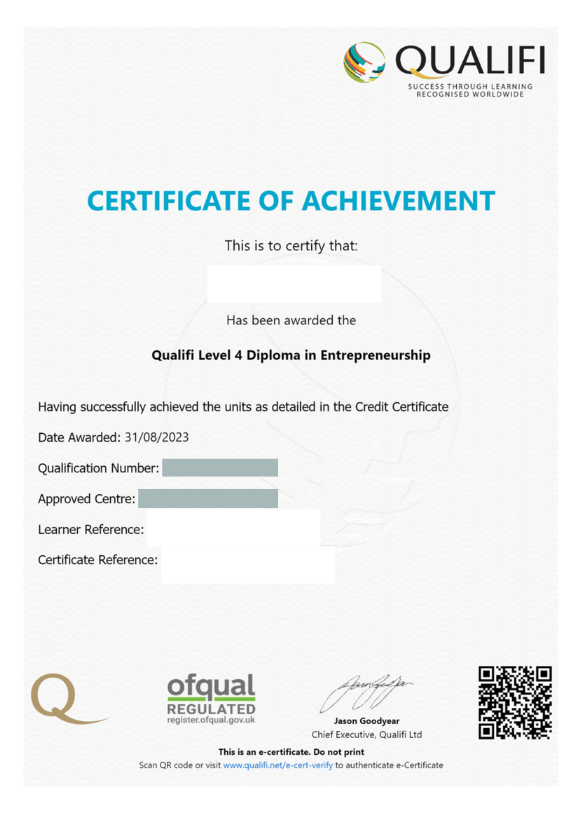
Sample Transcript:

2. Earn 10 Level 4 Pro Recognized e-Certificates
Upon completing the first year, students will receive 10 Level 4 Pro Recognized e-Certificates:
- Level 4 e-Certificate Managing Business Operations: Gain insights into the essential elements of business operations and their significance within the broader business context.
- Level 4 e-Certificate Business Environment: Examine the external influences on businesses and formulate approaches to navigate and manage changes.
- Level 4 e-Certificate Personal Effectiveness: Enhance personal capabilities in learning, time management, problem-solving, decision-making, and stress management.
- Level 4 e-Certificate The Entrepreneurial Manager: Investigate various viewpoints on entrepreneurial management and its impact on organizational transformation and growth.
- Level 4 e-Certificate Business Planning and Goal Setting: Understand the processes for establishing and accomplishing goals within an organization.
- Level 4 e-Certificate The Manager’s Toolkit: Acquire knowledge about a range of management tools and their practical uses in business scenarios.
- Level 4 e-Certificate Managing and Using Finance: Comprehend financial management within organizations, focusing on accounting principles and financial reporting.
- Level 4 e-Certificate Managing and Using Marketing: Delve into marketing as a crucial organizational function, covering aspects of planning and both internal and external marketing roles.
- Level 4 e-Certificate Psychology of Entrepreneurship: Explore the psychological aspects influencing entrepreneurial behavior and business management.
- Level 4 e-Certificate Innovation and Creativity: Study the importance of innovation and creativity in organizational success, including strategies to promote these elements.
Students can convert their e-certificates into hard copy certificates if needed (optional).
3. Gain competencies
Upon completing the first year, students will have acquired the following competencies and, along with the qualification received, will be ready to enter the workforce:
- Managing Business Operations: Apply operational management principles to enhance organizational effectiveness.
- Business Environment: Navigate external influences with strategic business responses.
- Personal Effectiveness: Enhance skills in self-management and decision-making.
- The Entrepreneurial Manager: Implement innovative management styles for organizational growth.
- Business Planning and Goal Setting: Strategize and execute effective business plans.
- The Manager’s Toolkit: Utilize management tools for strategic analysis and problem-solving.
- Managing and Using Finance: Manage finances with core accounting and financial principles.
- Managing and Using Marketing: Deploy marketing strategies to optimize market position.
- Psychology of Entrepreneurship: Apply psychological insights to drive entrepreneurial success.
- Innovation and Creativity: Foster innovation and creativity within organizational practices.
4. Qualified for various positions
Upon completing a Level 4 RQF diploma with these competencies, learners would be qualified for various entry-level and junior management roles across multiple industries. Here are some potential positions:
- Operations Support Staff: Assist in optimizing daily operations to enhance productivity under supervision.
- Market Research Assistant: Support strategy development by collecting and analyzing market trends and business data.
- Team Assistant: Help coordinate project and team activities, focusing on supporting optimal outcomes and efficiency.
- Innovation Associate: Assist in fostering innovation and change within the organization using basic entrepreneurial methods.
- Business Planning Coordinator: Help in drafting and implementing plans that align with the company's strategic goals.
- Assistant Consultant: Provide analytical support to improve business processes and address challenges under guidance.
- Financial Support Analyst: Assist in analyzing financial data and preparing reports to monitor the financial health of the organization.
- Marketing Assistant: Support in executing marketing campaigns to increase brand visibility and engagement.
- Entrepreneurial Support Staff: Aid in driving business growth initiatives through innovative thinking and solution-finding.
- Assistant Innovation Specialist: Support the implementation of creative solutions to ensure the company maintains its competitive advantage.
These roles offer opportunities to further develop the skills acquired in the diploma and prepare for more senior positions over time.
Year 2 Learn
1. Responding to the Changing Business Environment (R/507/1612)
Overview:
- Examines factors influencing business environments: socio-economic changes, market dynamics, and relationships between business, government, and citizens.
- Focuses on how businesses can respond to changing environments and develop strategies to manage external threats and opportunities.
- Helps managers understand the importance of responding effectively to socio-economic shifts and government policies.
Unit Aims:
- Introduce learners to dynamic factors affecting organisational operations.
- Develop practical skills to manage relationships between business, government, and society.
Course Details
This course is accredited and mapped to National Occupational Standards. It can also be accumulated towards earning an Undergraduate Award from SIMI Swiss if taken independently.
- View details on Learning Outcomes, Topics, and Suggested Readings HERE.
2. Effective Decision Making (Y/507/1513)
Overview:
- Explores decision-making models and processes used by organisations.
- Emphasizes incorporating stakeholder input and using information technologies in decision-making.
- Focuses on problem-solving, innovation, and participatory decision-making to enhance management practices.
Unit Aims:
- Develop an understanding of decision-making processes.
- Equip learners with tools for making informed, participatory decisions.
Course Details
This course is accredited and mapped to National Occupational Standards. It can also be accumulated towards earning an Undergraduate Award from SIMI Swiss if taken independently.
- View details on Learning Outcomes, Topics, and Suggested Readings HERE.
3. Business Development (D/507/1614)
Overview:
- Focuses on exploring new business opportunities, including idea refinement, market research, and feasibility assessments.
- Helps learners develop a comprehensive business plan to support the launch of new products or services.
Unit Aims:
- Equip learners with skills to assess market potential and plan new business opportunities.
- Focus on pitching business ideas effectively and creating a solid business strategy.
Course Details
This course is accredited and mapped to National Occupational Standards. It can also be accumulated towards earning an Undergraduate Award from SIMI Swiss if taken independently.
- View details on Learning Outcomes, Topics, and Suggested Readings HERE.
4. Business Models and Growing Organisations (H/507/1615)
Overview:
- Examines business models and growth strategies for scaling organisations.
- Looks at challenges and opportunities for businesses at different stages of growth, and how to manage and optimise expansion strategies.
Unit Aims:
- Help learners understand factors that contribute to business growth.
- Develop skills to manage growth strategies and apply business models effectively.
Course Details
This course is accredited and mapped to National Occupational Standards. It can also be accumulated towards earning an Undergraduate Award from SIMI Swiss if taken independently.
- View details on Learning Outcomes, Topics, and Suggested Readings HERE.
5. Customer Management (K/507/1616)
Overview:
- Focuses on customer relationship management (CRM) and practices for building, retaining, and enhancing customer relationships.
- Covers customer behaviour, segmentation, personalization, and strategies for improving customer satisfaction and loyalty.
Unit Aims:
- Provide insights into customer behaviour and equip learners with tools to manage customer relationships.
- Focus on CRM practices to enhance retention, satisfaction, and value for customers.
Course Details
This course is accredited and mapped to National Occupational Standards. It can also be accumulated towards earning an Undergraduate Award from SIMI Swiss if taken independently.
- View details on Learning Outcomes, Topics, and Suggested Readings HERE.
6. Risk Management and Organisations (T/507/1618)
Overview:
- Introduces risk management from both organisational and individual perspectives.
- Discusses balancing risk and opportunity, with a focus on innovation and risk mitigation through strategic planning.
- Helps learners assess and manage risks in various industries.
Unit Aims:
- Provide understanding of risk management processes.
- Develop learners' ability to assess risk profiles and implement strategies to reduce risk while fostering innovation.
Course Details
This course is accredited and mapped to National Occupational Standards. It can also be accumulated towards earning an Undergraduate Award from SIMI Swiss if taken independently.
- View details on Learning Outcomes, Topics, and Suggested Readings HERE.
Year 2 Earn
1. Get Qualifi Level 5 diploma in Business Management
Upon completing Year 2, students will receive:
- Qualifi Level 5 Diploma in Business Management - Qualification Number: 601/6049/4
Qualifi Level 5 Diploma: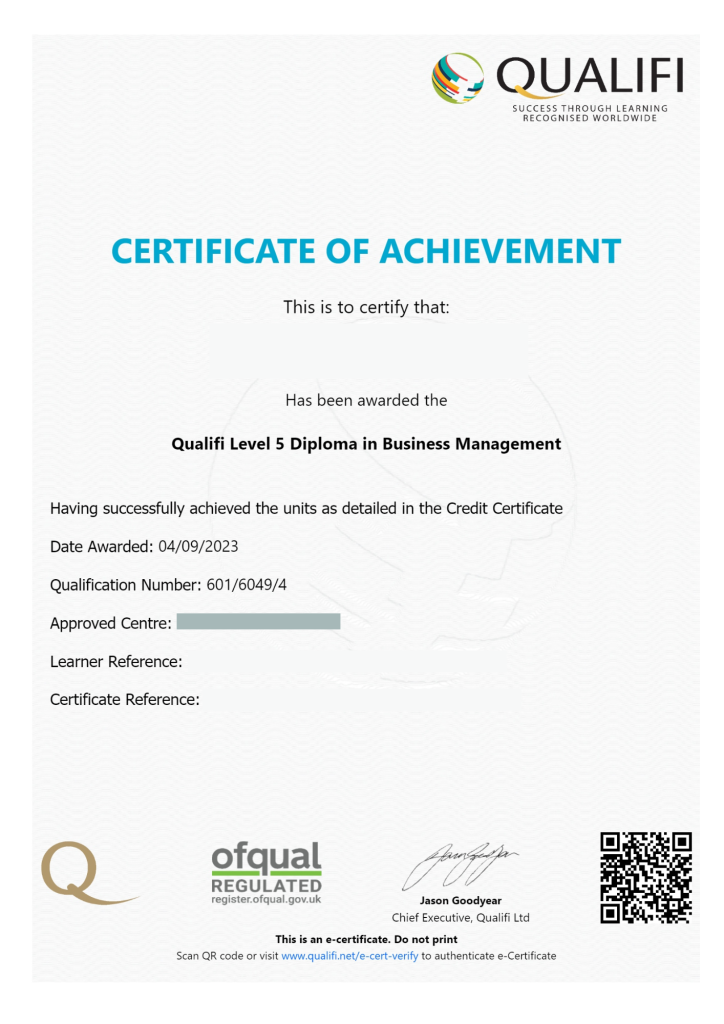
Sample Level 5 Transcript:
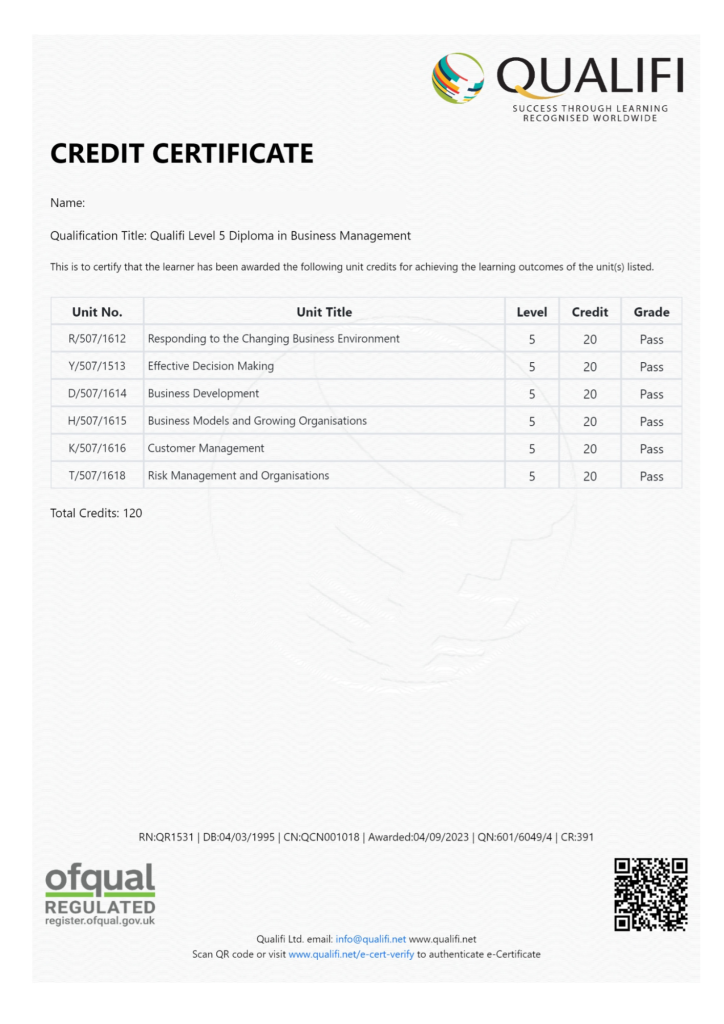
2. Earn 10 Level 5 Pro Recognized e-Certificates
Upon completing the second year, students will receive 10 Level 5 Pro Recognized e-Certificates:
- Level 5 e-Certificate in The Entrepreneurial Manager: Explore the characteristics and skills of entrepreneurs, including innovation, risk-taking, leadership, and problem-solving.
- Level 5 e-Certificate in Organisational Structures: Understand the factors that influence organisational structure, such as size, industry, culture, and strategy.
- Level 5 e-Certificate in Practical Accounting Analysis: Analyse accounts to gain insights into financial performance, identify trends, and inform decision-making.
- Level 5 e-Certificate in Business Planning and Goal Setting: Develop clear goals and objectives for a business, create a strategic plan, and allocate resources effectively.
- Level 5 e-Certificate in Politics and Business: Explore the impact of political factors on business, including government policies, regulations, and economic conditions.
- Level 5 e-Certificate in Business Law: Understand the legal responsibilities of managers, including employment law, contract law, and corporate governance.
- Level 5 e-Certificate in Managing in Today’s World: Explore modern business practices, such as sustainability, corporate social responsibility, and ethical leadership.
- Level 5 e-Certificate in Performance Management: Improve employee and business performance through strategies such as performance reviews, goal setting, and training and development.
- Level 5 e-Certificate in Marketing and Sales Planning: Develop a comprehensive marketing and sales plan, including market research, target market identification, product positioning, and sales strategies.
- Level 5 e-Certificate in Quantitative Skills: Acquire knowledge of numeric exercises and their application in business, including financial analysis, data analysis, and statistical modelling.
Students can convert their e-certificates into hard copy certificates if needed (optional).
3. Gain competencies
Upon completing the first year, students will have acquired the following competencies and, along with the qualification received, will be ready to enter the workforce:
- Apply leadership principles in a business environment.
- Review and implement business management principles within industry settings.
- Utilize management principles in specific organizational environments.
- Enhance employability by connecting management theories to practical business applications.
- Utilize problem-solving techniques tailored to business and industry challenges.
- Select, analyze, and synthesize information from diverse sources.
- Demonstrate effective verbal and written communication skills.
- Work autonomously and collaboratively as part of a team.
- Manage personal development and continuous growth effectively.
4. Qualified for various positions
A Level 5 Diploma in Business Administration typically prepares individuals for mid-level management and professional roles within various industries. Here are some qualified positions for someone with a Level 5 Diploma in Business:
- Assistant Department Head: Assists in managing department operations and supports the department head in supervisory responsibilities.
- Operations Coordinator: Coordinates daily operations, helping to ensure processes are efficient and organizational goals are met.
- Business Development Associate: Assists in identifying growth opportunities, supporting the development of strategic partnerships, and contributing to business expansion efforts.
- Project Lead: Leads smaller or segment-specific projects within larger initiatives, ensuring project components are executed on time and within scope.
- Marketing Coordinator: Supports the planning and execution of marketing strategies, managing specific campaigns, and helping to analyze market trends.
- HR Assistant Manager: Supports the HR management in handling recruitment, employee relations, and the implementation of HR policies.
- Sales Team Leader: Leads a sales team in daily activities, assisting in setting sales goals and strategies to enhance performance.
- Customer Service Supervisor: Oversees customer service operations within a team, focusing on maintaining high customer satisfaction levels.
- Junior Finance Officer: Supports financial operations including budgeting and financial planning, under the supervision of a senior finance officer.
These roles involve a higher level of responsibility and decision-making, often requiring a combination of practical experience and theoretical knowledge gained through the Level 5 qualification.
Year 3 Learn
1. Leadership and People Management (H/616/2734)
Overview
- Divided into three parts: leadership theories, people management techniques, and their application.
- Focuses on leadership styles, team dynamics, motivation, conflict resolution, and employee engagement.
- Applies these concepts to real-world management challenges..
Unit Aims
- Develop leadership capabilities.
- Enhance understanding of people management practices to improve team performance and organizational effectiveness.
Course Details
This course is accredited and mapped to National Occupational Standards. It can also be accumulated towards earning a Bachelor Award from SIMI Swiss if taken independently.
- View details on Learning Outcomes, Topics, and Suggested Readings HERE.
2. Business Research (K/616/2735 )
Overview
- Divided into three parts: understanding research methodology, applying research tools, and conducting a business research project.
- Covers qualitative and quantitative research methods, data collection tools, and business research project execution.
Unit Aims
- Develop research skills.
- Conduct rigorous business research that contributes to strategic decision-making and organizational development.
Course Details
This course is accredited and mapped to National Occupational Standards. It can also be accumulated towards earning a Bachelor Award from SIMI Swiss if taken independently.
- View details on Learning Outcomes, Topics, and Suggested Readings HERE.
3. Operations Management (M/616/2736)
Overview
- Divided into three parts: key operations management concepts, resource management, and applying operations tools.
- Focuses on supply chain management, process optimization, quality control, and performance measurement.
Unit Aims
- Enhance understanding of operations management principles.
- Develop skills for optimizing processes, improving efficiency, and ensuring operational excellence.
Course Details
This course is accredited and mapped to National Occupational Standards. It can also be accumulated towards earning a Bachelor Award from SIMI Swiss if taken independently.
- View details on Learning Outcomes, Topics, and Suggested Readings HERE.
4. Financial Decision Making (T/616/2737)
Overview
- Divided into three parts: core financial concepts, financial analysis tools, and real-world business applications.
- Covers financial statements, budgeting, cost analysis, and investment appraisal.
Unit Aims
- Equip learners with skills for making strategic financial decisions.
- Optimize financial performance to support business growth and sustainability.
Course Details
This course is accredited and mapped to National Occupational Standards. It can also be accumulated towards earning a Bachelor Award from SIMI Swiss if taken independently.
- View details on Learning Outcomes, Topics, and Suggested Readings HERE.
5. Sustainable Business Practices (A/616/2738)
Overview
- Divided into three parts: core financial concepts, financial analysis tools, and real-world business applications.
- Covers financial statements, budgeting, cost analysis, and investment appraisal.
Unit Aims
- Enhance understanding of sustainability in business.
- Equip learners to design and implement sustainable practices that align with organizational goals.
Course Details
This course is accredited and mapped to National Occupational Standards. It can also be accumulated towards earning a Bachelor Award from SIMI Swiss if taken independently.
- View details on Learning Outcomes, Topics, and Suggested Readings HERE.
6. Strategic Human Resource Management (F/616/2739)
Overview
- Divided into three parts: strategic HRM, HR practices, and real-world applications.
- Covers talent management, workforce planning, recruitment, training, and performance management.
Unit Aims
- Develop an understanding of the strategic role of HRM in business success.
- Equip learners with the skills to align HR strategies with organizational goals and foster a positive work culture.
Course Details
This course is accredited and mapped to National Occupational Standards. It can also be accumulated towards earning a Bachelor Award from SIMI Swiss if taken independently.
- View details on Learning Outcomes, Topics, and Suggested Readings HERE.
Year 3 Earn
1. Get Qualifi Level 6 diploma in Business Management
Upon completing Year 3, students will receive:
- OTHM Level 6 Diploma in Business Management - Qualification Number: 603/1037/6
Sample Level 6 Diploma:
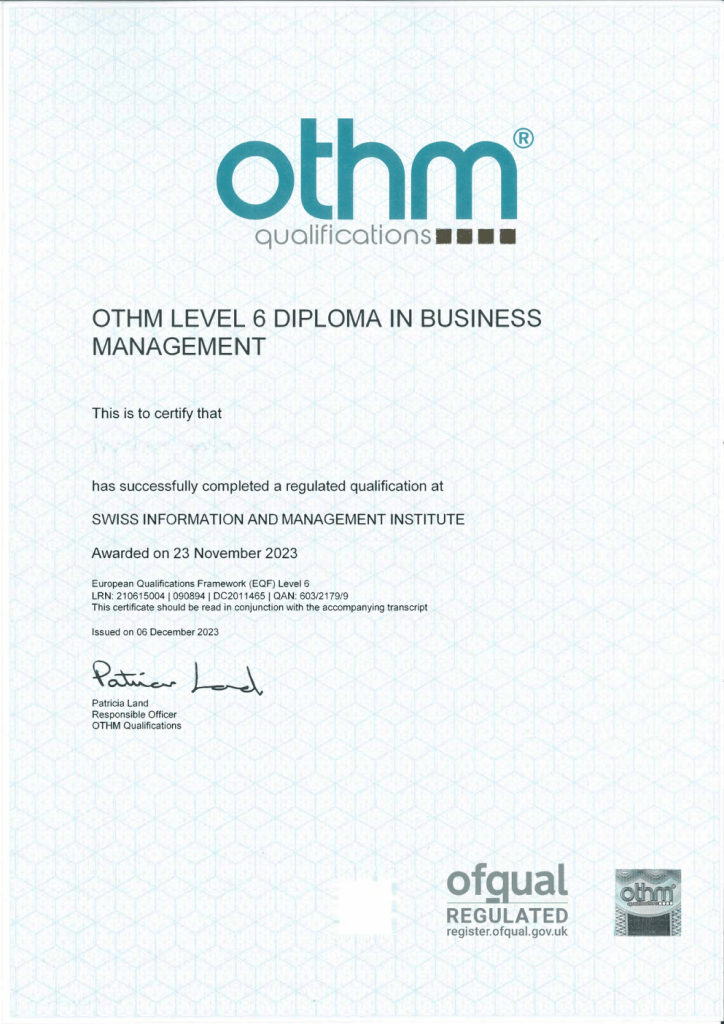
Page 1 of sample diploma
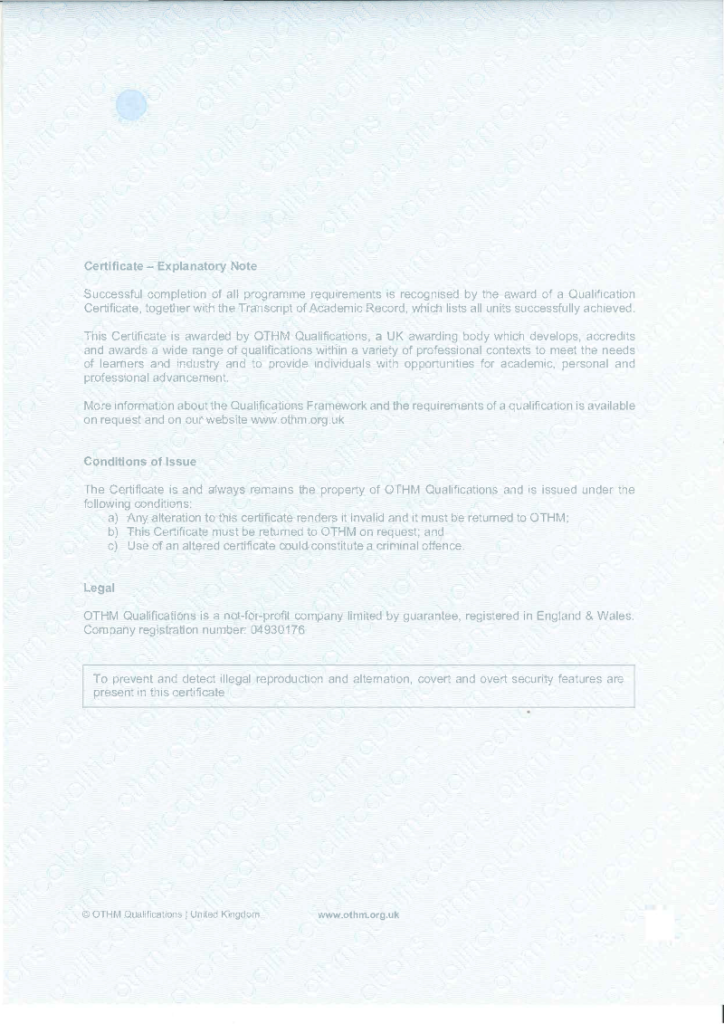
Page 2 of sample diploma
Sample Level 6 Transcript:
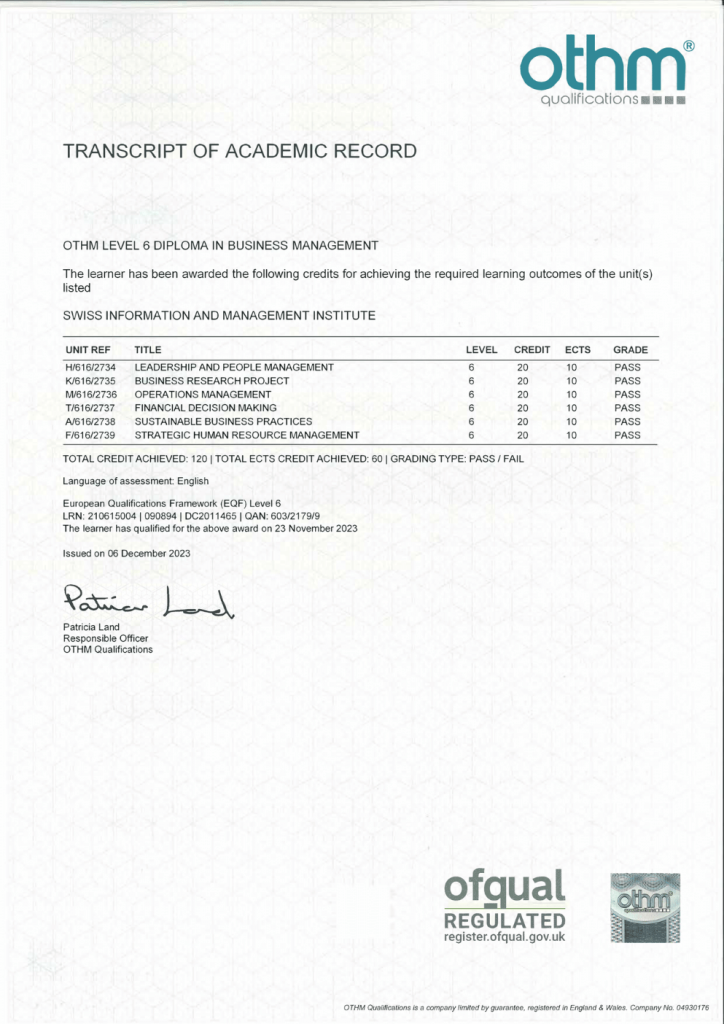
Page 1 of sample transcript
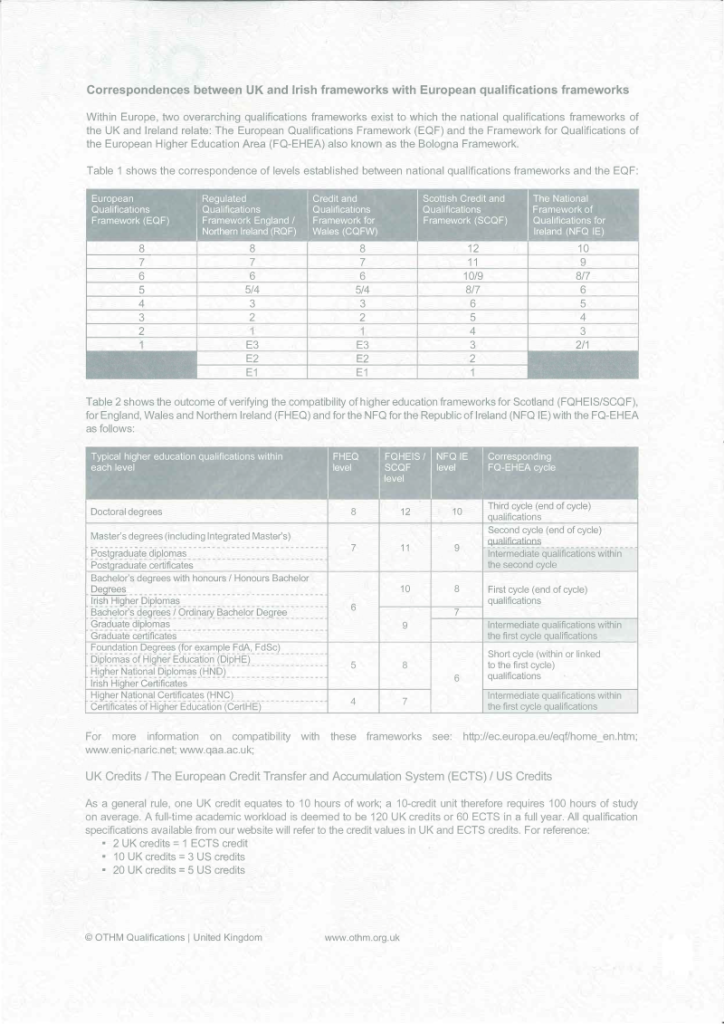
Page 2 of sample transcript
2. Earn 10 Level 6 Pro Recognized e-Certificates
Upon completing the first year, students will receive 10 Level 6 Pro Recognized e-Certificates:
- Level 6 in IT in Business: Evaluate the strategic role of IT in achieving competitive advantage.
- Level 6 in Effective Communication: Master communication strategies to enhance decision-making and collaboration.
- Level 6 in High-Performance Teams: Develop advanced team-building skills for cohesive and productive teams.
- Level 6 in Leadership Skills: Build adaptive leadership capabilities to navigate organizational challenges.
- Level 6 in Manager’s Toolkit: Learn versatile tools for analysis, problem-solving, and strategic planning.
- Level 6 in Managing and Using Finance: Understand finance’s role in guiding strategic decisions.
- Level 6 in Managing and Using Marketing: Create customer-centric strategies to deliver value and satisfaction.
- Level 6 in Managing Organizations: Explore how structure, culture, and management influence performance.
- Level 6 in Personal Effectiveness: Enhance productivity and self-leadership for impactful results.
- Level 6 in Quality and Excellence: Explore the meaning of quality and excellence in products, services, and organizational practices.
Students can convert their e-certificates into hard copy certificates if needed (optional).
3. Gain competencies
Upon completing the first year, students will have acquired the following competencies and, along with the qualification received, will be ready to enter the workforce:
- Strategic Management: Develop and implement strategies to achieve organizational objectives.
- Leadership Skills: Lead teams effectively in dynamic and competitive environments.
- Financial Decision-Making: Analyze financial data to inform strategic business decisions.
- Effective Communication: Master advanced communication techniques for stakeholder engagement.
- Marketing Strategies: Design and execute impactful marketing plans to drive business growth.
- Operational Management: Optimize processes and resources for efficient business operations.
- Problem-Solving and Decision-Making: Apply critical thinking to solve complex business challenges.
- Legal and Ethical Understanding: Navigate legal frameworks and ethical considerations in business.
- Research and Analysis: Conduct in-depth research to support evidence-based decisions.
- Organizational Development: Foster innovation, culture, and performance improvements.
4. Qualified for various positions
Upon completing a Level 6 RQF diploma with these competencies, learners would be qualified for various entry-level and junior management roles across multiple industries. Here are some potential positions:
- Business Manager: Oversee operations, strategy, and organizational goals.
- Operations Manager: Streamline processes and manage day-to-day business activities.
- Marketing Manager: Design and implement marketing strategies to enhance brand performance.
- Finance Manager: Analyze and oversee financial planning, budgeting, and decision-making.
- HR Manager: Develop and manage talent acquisition, employee relations, and HR strategies.
- Project Manager: Lead projects, ensuring they meet objectives, budgets, and deadlines.
- Strategic Planner: Develop long-term plans to achieve organizational goals.
- Team Leader: Motivate and manage teams to meet performance targets.
- Consultant: Provide expert advice in areas such as operations, marketing, or finance.
These roles offer opportunities to further develop the skills acquired in the diploma and prepare for more senior positions over time.
Bachelor Final Stage Learn
Capstone Project
Overview
A Capstone Project is a comprehensive, final assignment that BBA students complete at the end of their program. It is designed to encapsulate the knowledge and skills they have acquired throughout their studies. Unlike traditional exams, a Capstone Project requires students to apply what they've learned to a real-world problem or challenge in their field.
Unit Aims
The capstone aims to provide students:
- Practical Application: The project typically involves solving a practical business problem, conducting research, or developing a strategic plan for a real or simulated organization.
- Integration of Knowledge: Students must integrate and apply concepts from multiple courses, demonstrating their ability to synthesize information and use it effectively in a professional context.
- Research Component: Often, a Capstone Project includes a significant research element, requiring students to gather, analyze, and interpret data to support their conclusions and recommendations.
- Collaboration: Some Capstone Projects are completed in teams, simulating the collaborative nature of real business environments. Others may be individual projects, allowing for a deep dive into a specific area of interest.
- Presentation and Defense: Upon completion, students typically present their project to a panel of faculty members or industry professionals, and defend their methodology, findings, and recommendations.
Benefits of a Capston Project:
- Real-World Experience: Students gain hands-on experience by working on actual business problems or scenarios.
- Skill Development: The project hones critical thinking, problem-solving, research, and communication skills.
- Portfolio Piece: The completed project can serve as a showcase of the student's capabilities, useful for job interviews or career advancement.
- Networking: Projects often involve collaboration with industry professionals, providing valuable networking opportunities.
In essence, a Capstone Project is the culmination of an BBA program, allowing students to demonstrate their expertise and readiness for professional challenges.
Bachelor Final Stage Earn
1. Get Bachelor of Business Administration (with Hons) in Entrepreneurship and Management
The Capstone Project, as the culmination of their learning, will showcase learners' ability to apply theoretical knowledge to practical, real-world challenges. This not only enhances their academic credentials but also provides employers with a clear indication of their expertise in entrepreneurship and management.
The selected major will be integrated into their academic progression and will be clearly reflected in their BBA (with Hons) in Entrepreneurship and Management qualification, as well as the official transcripts issued by SIMI Swiss.
2. Gain competencies
Upon completing the first year, students will have acquired the following competencies and, along with the qualification received, will be ready to enter the workforce:
- Guide teams effectively in various business environments.
- Utilize core management practices across different industries.
- Tailor management strategies to specific organizational needs.
- Enhance employability by linking management theories to practical applications.
- Address specific business challenges with problem-solving techniques.
- Critically assess and synthesize information from multiple sources.
- Master verbal and written communication skills in business contexts.
- Excel in both independent and team-based work environments.
3. Qualified for various positions
A BBA (with Hons) in Entrepreneurship and Management equips graduates for diverse roles within the business sector, focusing on innovation, strategy, and management. Here are several career paths suitable for someone with this degree:
- Startup Founder: Launches and manages new business ventures, driving the development of innovative products or services.
- Business Development Manager: Identifies and executes growth opportunities within and outside a company to increase revenue and market share.
- Product Manager: Oversees the development, marketing, and refining of products to meet customer needs and organizational goals.
- Operations Manager: Streamlines operations, improves productivity, and ensures the effective use of resources across organizational departments.
- Marketing Manager: Develops comprehensive marketing strategies to enhance brand awareness and drive sales.
- Financial Analyst: Assesses financial data to help guide investment decisions, manage risks, and plan for future financial needs.
- Management Consultant: Provides expert advice to improve an organization's efficiency, profitability, and structure.
These roles involve a higher level of responsibility and decision-making, often requiring a combination of practical experience and theoretical knowledge gained through the Level 5 qualification.
Entry requirements & Learning methods
1. Entry Requirements
In addition to the entry requirements, candidates applying to the program are also assessed for their suitability by the admissions committee before joining the program to ensure that they can acquire and benefit from the program.
Entry requirements:
To enroll this program, learners must possess the criteria below:
- Attained a Level 3 Diploma under the NQF/QCF/RQF system or its equivalent.
English requirements:
If a learner is not from a predominantly English-speaking country, proof of English language proficiency must be provided.
- Common European Framework of Reference (CEFR) level B2 or equivalent;
- Or A minimum TOEFL score of 101 or IELTS 5.5; Reading and Writing must be at 5.5 or equivalent.
Please note:
- SIMI Swiss does not accept entry qualifications from counterfeit universities, Diploma Mills, or universities accredited by unreliable accreditation agencies.
- SIMI Swiss reserves the right to make admissions decisions based on the requirements of recognized agencies and the global quotas of the program.
2. Learning methods
The qualification is designed to be delivered over 4 academic years for full-time study, but it also offers a flexible model to accommodate part-time and distance learning options.
The qualification is delivered in the following modes:
1. On-campus Mode in Switzerland
- Blended Learning: Combines the benefits of traditional classroom instruction with the flexibility of online learning, allowing students to participate in in-person sessions on campus while also benefiting from digital resources such as online lectures, discussion forums, and virtual collaborative tools.
- Full-time Learning: Involves attending campus-based classes on a set schedule, allowing for closer interaction with professors, peers, and industry professionals. Students also have the opportunity to participate in various extracurricular activities, internships, and on-campus events, providing them with a well-rounded experience.
Learn more about SIMI Campuses [HERE]
2. Off-campus Mode:
The program combines Live Classes with lecturers and local tutors (where applicable) for a hybrid learning experience.
- Offering interactive, real-time engagement with instructors.
- Local tutors provide additional guidance to help learners apply theoretical concepts to practical scenarios (please note that local tutors only apply where SIMI has a scientific partner).
- Ideal for busy professionals seeking flexibility with personalized support.
Learn more about the overview of enrolling in online classes at SIMI Swiss [Video HERE]
Learn more about the effectiveness of SIMI Pedagogy [Video HERE]
3. Fully Online Mode:
The program is implemented using a combined automated training model that includes:
- Optimized Online Learning System: Designed to enhance the self-study process.
- Bite-Sized Lectures: Lessons are structured in short, manageable modules, enabling students to grasp the content immediately after completing each module.
- Comprehensive Support System: Provides students with the necessary tools and support to efficiently fulfil course requirements.
Learn more about how to use the automated training model at SIMI Swiss [Video HERE]
3. Academic Support
We understand that pursuing an accredited postgraduate program can be both exciting and challenging, especially for busy adult learners. To help you overcome these challenges, we’ve created the SIMI Swiss Supporting Systems, designed to guide you through any difficulties during your studies.
For a full overview of the support available, be sure to watch our informative videos, offering help at every stage of your academic journey.
Supplemental resources and Master Pro Certified
1. Supply 30 courses mapped to National Occupational Standards
The National Occupational Standard is a crucial benchmark that ensures educational programs meet workplace demands. The BBA (with Hons) in Entrepreneurship and Management program is fully aligned with the Senior Leader position according to the national competency framework.
Beyond the comprehensive BBA (with Hons) in Entrepreneurship and Management curriculum, students gain access to an additional 30 professional modules covering a wide range of specializations. This expanded knowledge base enables students to build on their classroom learning and directly apply it to their specific job roles and needs, offering valuable tools for professional growth.
Unlike other study materials, this interactive and exclusive set of resources, developed by SIMI Swiss, is specifically designed for self-study. The knowledge system, aligned with the National Occupational Standard, is divided into 30 knowledge groups, each further broken down into bite-sized lessons. This approach allows students to absorb content quickly and effectively, even when away from their computer or phone.
- Learn more about the National Occupational Standard system [HERE].
- Learn more about the exclusive pedagogy for the supplemental interactive study materials [HERE].
- Learn more about the Master Professional Certified [HERE]
The 30 interactive courses that enhance knowledge and automatically accumulate 30 separate Master Pro Certifications include:
- Level 4 Pro-Certificate in Managing business operations
- Level 4 Pro-Certificate in Business environment
- Level 4 Pro-Certificate in Personal effectiveness
- Level 4 Pro-Certificate in The entrepreneurial manager
- Level 4 Pro-Certificate in Business planning and goal setting
- Level 4 Pro-Certificate in The manager’s toolkit
- Level 4 Pro-Certificate in Managing and using finance
- Level 4 Pro-Certificate in Managing and using marketing
- Level 4 Pro-Certificate in Psychology and entrepreneurship
- Level 4 Pro-Certificate in Innovation and creativity
- Level 5 Pro-Certificate in The Entrepreneurial Manager
- Level 5 Pro-Certificate in Organisational Structures
- Level 5 Pro-Certificate in Practical Accounting Analysis
- Level 5 Pro-Certificate in Business Planning and Goal Setting
- Level 5 Pro-Certificate in Politics and Business
- Level 5 Pro-Certificate in Business Law
- Level 5 Pro-Certificate in Managing in Today’s World
- Level 5 Pro-Certificate in Performance Management
- Level 5 Pro-Certificate in Marketing and Sales Planning
- Level 5 Pro-Certificate in Quantitative Skills
- Level 6 Pro-Certificate in IT in Business
- Level 6 Pro-Certificate in Effective Communications
- Level 6 Pro-Certificate in High Performance Teams
- Level 6 Pro-Certificate in Leadership Skills
- Level 6 Pro-Certificate in Manager’s Toolkit
- Level 6 Pro-Certificate in Managing and Using Finance
- Level 6 Pro-Certificate in Managing and Using Marketing
- Level 6 Pro-Certificate in Managing Organisations
- Level 6 Pro-Certificate in Personal Effectiveness
- Level 6 Pro-Certificate in Quality and Excellence
2. Supply 30 webinars mapped to National Occupational Standards
In addition to comprehensive lessons with built-in interactive activities and an exclusive self-study pedagogy, each knowledge module aligned with the National Occupational Standard includes instructional videos (webinars). BBA (Hons) in Majors students at SIMI Swiss are provided with 30 video webinars corresponding to the 30 interactive modules, ensuring a well-rounded and complete learning experience.
The 30 video webinars include:
- Webinar - Managing Business Operations Webinar: Enhance efficiency across business operations for organizational success.
- Webinar - Business Environment Webinar: Navigate external business influences to align corporate strategies.
- Webinar - Developing Personal Skills Webinar: Strengthen key personal management skills for career advancement.
- Webinar - The Entrepreneurial Manager Webinar: Explore impactful entrepreneurial management styles for business innovation.
- Webinar - Business Planning and Goal Setting Webinar: Master strategic planning and goal-setting to achieve business objectives.
- Webinar - The Manager’s Toolkit Webinar: Utilize essential management tools to tackle business challenges effectively.
- Webinar - Managing and Using Finance Webinar: Optimize financial management for better fiscal decision-making and reporting.
- Webinar - Managing and Using Marketing Webinar: Develop strategic marketing initiatives to enhance brand engagement and growth.
- Webinar - Psychology and Entrepreneurship Webinar: Leverage psychological insights to drive innovative entrepreneurial actions.
- Webinar - Innovation and Creativity Webinar: Cultivate organizational creativity and innovation for competitive advantage.
- Webinar - The Entrepreneurial Manager: Discusses skills and strategies for managing and leading entrepreneurial ventures.
- Webinar - Organisational Structures: Examines different organizational structures and their impact on management and operations.
- Webinar - Practical Accounting Analysis: Focuses on analyzing financial data to make informed business decisions.
- Webinar - Business Planning and Goal Setting: Teaches methods for creating effective business plans and setting strategic goals.
- Webinar - Politics and Business: Explores the relationship between politics, government policies, and business operations.
- Webinar - Business Law: Provides an understanding of the legal environment affecting business practices and decision-making.
- Webinar - Managing in Today’s World: Focuses on modern challenges in management, including globalization and technology.
- Webinar - Performance Management: Examines techniques for managing and improving employee performance to align with business goals.
- Webinar - Marketing and Sales Planning: Teaches how to create marketing and sales strategies that drive growth and profitability.
- Webinar - Quantitative Skills: Develops analytical skills using quantitative methods for business decision-making.
- Webinar - IT in Business: Explores the role of information technology in enhancing business efficiency and decision-making.
- Webinar - Effective Communications: Focuses on improving communication in business, emphasizing clarity and influence.
- Webinar - High Performance Teams: Discusses strategies for building and leading high-performing teams in organizations.
- Webinar - Leadership Skills: Focuses on developing essential leadership skills for managing teams and organizations.
- Webinar - Manager’s Toolkit: Introduces key management tools and techniques for effective decision-making and problem-solving.
- Webinar - Managing and Using Finance: Teaches how to effectively manage financial resources for business success.
- Webinar - Managing and Using Marketing: Focuses on applying marketing strategies to enhance business growth and customer engagement.
- Webinar - Managing Organisations: Examines strategies for managing organizational structure, culture, and operations.
- Webinar - Personal Effectiveness: Focuses on improving personal productivity and effectiveness in a professional setting.
- Webinar - Quality and Excellence: Explores the principles of quality management and achieving excellence in business processes.
3. Earn 30 Undergraduate Pro Certifications via automated testing
While an BBA (with Hons) in Majors degree certifies academic achievement at the Bachelor's level, in the workplace, Undergraduate Pro Certifications help professionals demonstrate their knowledge, skills, and ability to take responsibility in their specific fields.
As a program mapped to National Occupational Standards, along with the supplemental knowledge system, students can engage in self-study through interactive lessons, attend webinars, and take online tests to earn 30 Undergraduate Pro Certifications. Each ProCert reflects Level 4,5,6 (Undergraduate Level), outlines the Learning Outcomes, and provides certification upon completion.
If students wish to convert their e-Undergraduate Pro Certifications to hard copies, they can use an optional service for a minimal fee.
The 30 Undergraduate ProCerts that learners can obtain during the Bachelor of Entrepreneurship and Management program (note: this is optional):
- Level 4 Pro-Certificate in Managing business operations
- Level 4 Pro-Certificate in Business environment
- Level 4 Pro-Certificate in Personal effectiveness
- Level 4 Pro-Certificate in The entrepreneurial manager
- Level 4 Pro-Certificate in Business planning and goal setting
- Level 4 Pro-Certificate in The manager’s toolkit
- Level 4 Pro-Certificate in Managing and using finance
- Level 4 Pro-Certificate in Managing and using marketing
- Level 4 Pro-Certificate in Psychology and entrepreneurship
- Level 4 Pro-Certificate in Innovation and creativity
- Level 5 Pro-Certificate in The Entrepreneurial Manager
- Level 5 Pro-Certificate in Organisational Structures
- Level 5 Pro-Certificate in Practical Accounting Analysis
- Level 5 Pro-Certificate in Business Planning and Goal Setting
- Level 5 Pro-Certificate in Politics and Business
- Level 5 Pro-Certificate in Business Law
- Level 5 Pro-Certificate in Managing in Today’s World
- Level 5 Pro-Certificate in Performance Management
- Level 5 Pro-Certificate in Marketing and Sales Planning
- Level 5 Pro-Certificate in Quantitative Skills
- Level 6 Pro-Certificate in IT in Business
- Level 6 Pro-Certificate in Effective Communications
- Level 6 Pro-Certificate in High Performance Teams
- Level 6 Pro-Certificate in Leadership Skills
- Level 6 Pro-Certificate in Manager’s Toolkit
- Level 6 Pro-Certificate in Managing and Using Finance
- Level 6 Pro-Certificate in Managing and Using Marketing
- Level 6 Pro-Certificate in Managing Organisations
- Level 6 Pro-Certificate in Personal Effectiveness
- Level 6 Pro-Certificate in Quality and Excellence
Check out the way you could get 30 electric Undergraduate Professional Certified [Video HERE]
Program accreditations
1. Accreditation review guidelines by SIMI Swiss
SIMI is the first higher education institute in Zug, Switzerland, to achieve comprehensive international accreditations at both the organizational and program levels. The video below guides you through the step-by-step process of verifying and checking SIMI Swiss's accreditations and recognitions. All Bachelor Swiss programs, owned by SIMI Swiss, benefit from these quality standards.
2. Refer to SIMI Swiss information in SVEB Switzerland
SVEB Switzerland (Schweizerischer Verband für Weiterbildung) is the Swiss Federation for Adult Learning and serves as the national umbrella organization for adult education in Switzerland. SVEB is recognized as the leading authority in Switzerland for promoting and supporting lifelong learning and professional development through a wide range of educational programs and certifications.
Benefits of the SIMI Programs Published in SVEB:
- National & Federal Recognition: Being published in SVEB gives the SIMI Swiss program official recognition in Switzerland, validating its quality and adherence to Swiss educational standards.
- Increased Credibility: Membership and listing with SVEB enhance the credibility of the SIMI Swiss program, making it more attractive to prospective students and employers who value SVEB-approved programs.
- Professional Advancement: Programs listed with SVEB are often aligned with the needs of the Swiss job market, increasing graduates' employability and supporting their career progression within Switzerland.
- Access to a Wider Network: Association with SVEB connects the SIMI Swiss program to a broader network of educational institutions, professionals, and employers across Switzerland, offering opportunities for collaboration, networking, and knowledge exchange.
- Compliance with Swiss Standards: SVEB ensures that SIMI Swiss programs meet high educational standards, including up-to-date content, qualified instructors, and effective teaching methods, enhancing the overall learning experience for students.
- Support for Lifelong Learning: SVEB’s focus on adult education means the SIMI program aligns with lifelong learning principles, supporting students in their ongoing professional development.
Check the SIMI Swiss programs on SVEB HERE.
3. Accreditation of Level 6 Diploma in Business Management of OTHM
The BBA program at SIMI Swiss offers a dual degree in partnership with OTHM, the Ofqual UK.Gov awarding body:
- Recognized as an organization by the educational authority of the United Kingdom, Ofqual (UK.Gov). Recognition Number: RN5284. Refer to the recognition information CLICK HERE
- OTHM Level 6 Diploma in Business Management is accredited with the Ofqual UK.Gov code 603/2179/9. Refer to the accreditation information CLICK HERE
Reference:
- Guidelines of how to check the recognition of OTHM: CLICK HERE
- Why Level UK offers optimal educational effectiveness for learners?: CLICK HERE
- The meaning of Level System in the labor market in the context of global labor mobility: CLICK HERE
- The meaning of Level System in global diploma recognition: CLICK HERE
You will get
Dual Bachelor
30 Pro Recognized
Swiss Student Card
Academic Support
Update Trend
All Undergraduate Programs
Fully Accredited
Multi Recognition
Executive Bachelor of Business Administration
Powered by BizSchool of Zug
Bachelor of Business Administration
Powered by BizSchool of Zug
Bachelor of Entrepreneurship and Management
Powered by BizSchool of Zug
Bachelor of IT and Computing
Powered by IT Institute of Switzerland
Bachelor IT and E-commerce
Powered by IT Institute of Switzerland
Bachelor of IT and Networking
Powered by IT Institute of Switzerland
Bachelor of IT and Web Design
Powered by IT Institute of Switzerland
Bachelor of Accountant & Finance
Powered by BizSchool of Zug
Bachelor of Health & Social Care Management
Powered by Swiss Healthcare School
Bachelor of Bachelor of Tourism & Hospitality Management
Powered by Hospitality School
Bachelor of Teaching & Learning
Powered by Swiss EduSchool
Bachelor of Logistics and Supply Chain Management
Powered by LSCM Switzerland
